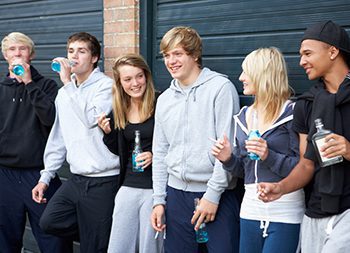Drugs and alcohol
Illegal drug use among teenagers in the U.S. is on the decline, but the abuse of prescription drugs (especially pain relievers and ADHD drugs) is increasing. Many teens use alcohol, and often their parents are either aware of it, or condone their drinking.
Statistics on teenage drug and alcohol use:
- Alcohol kills six times more children each year than all other illicit drugs combined.
- Forty percent of children who started drinking before age 13 become an alcoholic, while 10 percent of those starting before age 17 become an alcoholic.
- Teens who drink alcohol are 50 times more likely to try cocaine.
- The vast majority of children who drink got the alcohol from their own home, or the home of a friend.
- Since marijuana became legal in Oregon, teen use of cannabis products has skyrocketed. While many teens believe marijuana is harmless, recent research shows a permanent loss of IQ of up to 15 points in the developing brains of teens who regularly use cannabis.
- Ten percent of teens report having attended a rave (a large party with drugs and alcohol present in most cases).
- Twenty percent of eighth-graders report having tried marijuana.
- Methamphetamine (commonly called meth, speed, crystal, glass, crank, tweak, yaba) is the most commonly used illicit drug in Oregon, just behind marijuana. Cheap and readily available, meth is highly addictive.
- Thirty percent of teens know a friend who has used ecstasy (also known as X, E, XTC, rolls, beans, Adam). Ecstasy is a popular recreational psychoactive drug with stimulant and euphoric effects that has the potential to kill.
Tips to help keep your teen drug- and alcohol-free:
- Talk to your son about the dangers of drug and alcohol use. Children who consistently get messages from their parents are 50 percent less likely to use illicit drugs and alcohol.
- Keep your son busy. Idle time is not necessarily a good thing for teens, especially if they are alone.
- Monitor your son’s activities. Know who he spends time with, where he is going, what he is doing, and when he’ll be home.
- Set clear expectations for your child’s behavior. And offer some degree of increased freedom as a reward for consistent good judgment.
- Be clear about consequences for bad decisions and follow through on your punishments.
- It takes a village to raise a healthy teen. Network with other parents, teachers, coaches and family members to help keep your teen on track
- Model the behavior you want to see. If your child sees you drunk or high, it dramatically increases the likelihood that they will follow suit.

